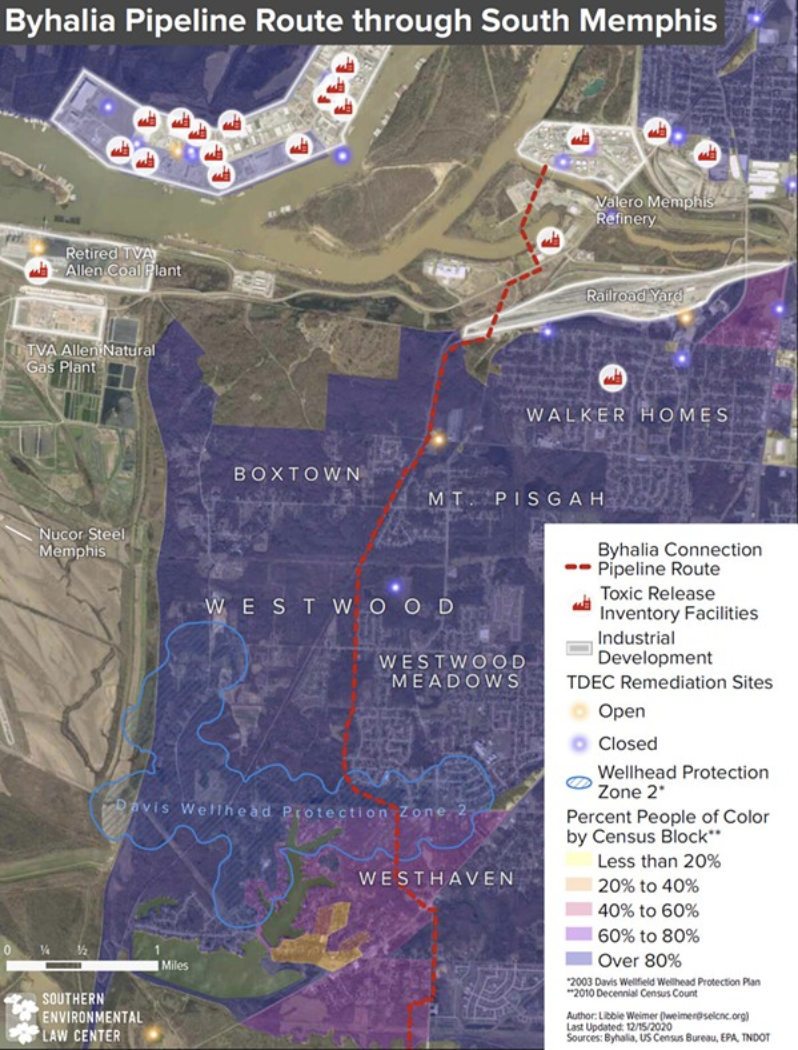Brady Watson, former Civic Engagement Coordinator for the Southern Alliance for Clean Energy, also contributed to this blog post.
Community opposition in Memphis to the proposed Byhalia Connection Pipeline, which would transport crude oil through Southwest Memphis and northern Mississippi, has grown in recent months, leading Memphis City Council to consider passing an ordinance to help give the community more control over the project.

As we have previously written, there is no place for a project like this that seeks to prolong the era of oil-based transportation by suing families in predominantly Black, low-income neighborhoods for land rights through eminent domain–families who already bear too heavy a burden from nearby sources of pollution–despite minimal public benefit and subjecting Memphis’ drinking water supply to the threat of an oil spill.
Alternatively, Memphis has the power to claim a future of economic, environmental, and racial equity, bolstered by renewable energy and clean, electric transportation, free of burdensome pipelines and fossil fuel pollution.
Tuesday of this week was a highly anticipated day when the Memphis City Council was expected to vote on the ordinance on the third and final reading to grant the city more oversight over pipeline projects. But instead, the Council opted to delay the vote for at least two weeks. While the company behind the Byhalia Pipeline project, Plains All American, offered to “pause” the project if City Council delayed the vote on the ordinance, this offer did not come up during discussions of the ordinance at the Public Works Committee meeting, so it is not clear how much the offer did or did not impact the decision to delay the vote.
The City Council committee did however proceed with hearing from supporters and opponents of the proposed ordinance, who were allowed to make their case. Attorney George Nolan with the Southern Environmental Law Center (SELC) stated the intent of the ordinance was to protect the Memphis Sand Aquifer and the people of Memphis, citing holes in regulations related to groundwater that the ordinance was designed to fill. Mr. Nolan explained that the ordinance would require three things of any future underground infrastructure project for hazardous or toxic material transportation or storage:
- Proof that any such project would not harm the Memphis Sand Aquifer,
- Assurance that any such project does not disproportionately impact neighborhoods that have been harmed by such projects in the past, and;
- Assurance that any company proposing a project must have the required financial resources to deal with any future issues with the project, and not place any financial burden on the city.
Scott Crosby, also with SELC, mentioned that the only changes to the ordinance since the City Council voted unanimously to approve it on the second reading at the April 6th meeting were improvements to the ordinance after feedback from stakeholders. He also acknowledged that litigation was already likely to come from Plains if the ordinance is passed, and that had not changed since City Council’s last vote.
Robert Spence spoke in opposition to the ordinance on behalf of Plains All American because of perceived potential impacts on local businesses. He argued that such an ordinance would be in violation of federal and state law, ignoring the concept of federalism and superseding higher authorities. He even went so far as to say the ordinance violates the state and federal constitutions. Finally, he warned of litigation against the City as well.
The last speaker was Eric Brown, the Vice President and General Manager of the Memphis Valero refinery, who said he expected this ordinance to negatively impact the refinery, impeding the ability to repair and replace existing infrastructure. He also said that the Valero plant would follow with litigation should the ordinance pass.
Councilman Worth Morgan mentioned his desire to learn more about the specifics of what kinds of hazardous materials would be covered under the ordinance, and that he would seek input from the SELC attorneys. Councilwoman Robinson raised concerns about how the ordinance might pose problems to Valero and Plains, and that each side cited studies showing conflicting accounts of the risks associated with leaks in the pipeline.
The item was pulled from the agenda and will now be heard at the May 4th City Council meeting.
Also on Tuesday, Memphis Mayor Jim Strickland announced his opposition to the pipeline. Additionally, Rep. Steve Cohen of Memphis sent a letter along with several colleagues in the U.S. House of Representatives to President Biden last week asking that he reconsider permits granted for the pipeline.
The Southern Alliance for Clean Energy (SACE) opposes the Byhalia Connection Pipeline, a proposed pipeline that would pump crude oil from Southwest Memphis to Marshall County, Mississippi. Amidst our dire need to rapidly transition from fossil fuels to clean energy, there is no place for a project like this that seeks to prolong the era of oil-based transportation by suing families in predominantly Black, low-income neighborhoods for land rights through eminent domain–families who already bear too heavy a burden from nearby sources of pollution–despite minimal public benefit and subjecting Memphis’ drinking water supply to the threat of an oil spill. Memphis has the power to claim a future of economic, environmental, and racial equity, bolstered by renewable energy and clean, electric transportation, free of burdensome pipelines and fossil fuel pollution.
Stay tuned for future updates.